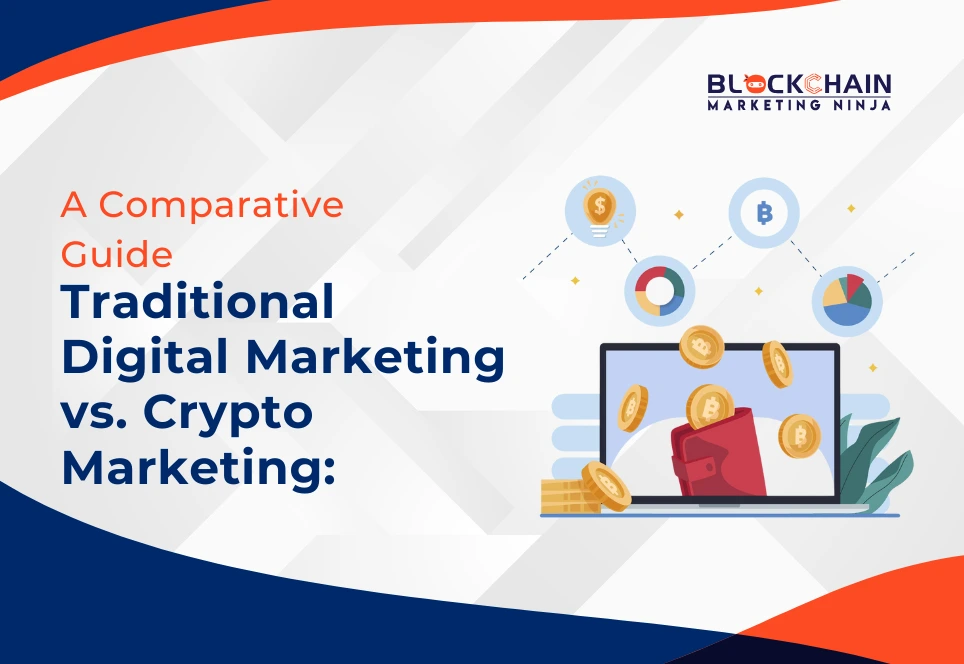Digital marketing promotes the products through digital channels. Crypto marketing services are a subset of digital marketing services that involve the promotion of cryptocurrency, blockchain, and NFTs. While they share some similarities, crypto marketing differs in its regulatory approach and requires extensive experience in blockchain technology. Cryptocurrencies are decentralized and highly volatile, requiring special marketing strategies that take into account demographics, regulation, communication, and technology. Intuitive planning is the key to maximizing campaign performance and avoiding wasted budget in this ever-evolving competitive landscape.
Understanding Traditional Digital Marketing
Traditional digital marketing utilizes digital platforms to advertise products and brands, generate leads, and close sales. It uses SEO, email marketing, and social media campaigns in different industries.
This includes search engine optimization (SEO) to boost organic searches (e.g., advancing e-commerce websites higher up the Google rankings), email marketing for a specific campaign (e.g., recommending SaaS subscriptions), social media marketing to reach audiences (e.g., getting them to go to the e-commerce site), and pay-per-click (PPC) advertising for immediate exposure (e.g., increasing brand awareness for a new e-commerce product). Content marketing—the art of producing useful content for customer retention—is essential across industries as well. These practices create brand loyalty and increase revenue in a variety of industries, such as ecommerce, SaaS, and retail.
What is Crypto Marketing?
Crypto marketing is a digital marketing niche that targets cryptocurrency, blockchain technology, and projects. A blockchain marketing agency designs campaigns that help generate brand recognition and adoption in the cryptosphere. Favoriting blockchain, non-fungible tokens (NFTs), ICOs, DeFi platforms, and other Web3 projects are among the key areas of focus. Crypto marketing is different from digital marketing because it focuses on community and builds connections with prospective users and investors. Social proof from testimonials, influencer reviews, and community engagement is very important.
Crypto marketing services that succeed in their industry capitalize on these attributes to establish trust and reputation. NFT projects, for instance, leverage unique crypto marketing strategies to engage collectors, ICOs to attract investors, and Web3 platforms to grow user communities.
Key Differences Between Traditional and Crypto Marketing
Traditional and crypto marketing both aim to market a product or service, but they have quite different audiences, channels, strategies, and end goals.
- Target Audience – Traditional marketing targets a large and varied demographic, interest, and behavioral target. Cryptocurrency marketing services, on the other hand, are aimed at tech-savvy individuals who want to invest and participate in the crypto scene. They are frequently targeted and require personalized messages.
- Advertising Channels – Most traditional marketing depends on well-known mediums such as Google Ads, Facebook Ads, and Instagram. Crypto marketing, however, relies on channels more suited to its community. Twitter, Discord, and Telegram are crucial, followed by specialized crypto advertising platforms such as Coinzilla and Bitmedia, which cater to a more focused and dedicated audience.
- Community Engagement – Strategic marketing helps in building brand trust by consistently engaging with customers and nurturing strong relationships. A crypto marketing agency puts even greater emphasis on active community management in dedicated communities such as Telegram and Discord. Many crypto marketing solutions show the importance of creating a relationship of trust and belonging within these online communities is essential.
- Content Tone and Strategy – In traditional marketing, we use informative, appealing, and product-oriented content. Crypto marketing requires an open, technical, and investment-grade strategy. Since cryptocurrency investments are risky and blockchain is a very complex technology, thorough descriptions are crucial to fostering investor attractiveness and trust.
- Marketing Goals – Sales and brand loyalty are the core objectives of traditional marketing. Crypto marketing successfully achieves multiple objectives, such as securing funding through ICOs or crowdfunding, building community trust and credibility, and helping in effectively communicating complex technical information to an experienced audience. The regulated and volatile crypto environment requires even more attention to legal compliance and risk.
Conclusion
Navigating crypto marketing successfully involves a thorough understanding of its core differences from digital marketing. Both rely on the web, but crypto marketing targets technical, specific markets through Twitter and Discord, placing a strong emphasis on community and openness. While conventional marketing focuses on brand recognition and direct sales, crypto marketing focuses on building trust, raising funds, and simplifying technical concepts. By considering these differences in the market, messaging, and channels, we could result in wasted campaigns and lost revenue in this highly competitive, thriving space.
